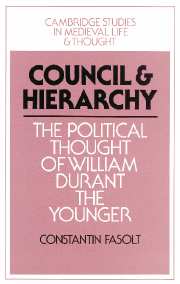Book contents
- Frontmatter
- Contents
- Acknowledgments
- List of abbreviations
- List of manuscript sigla
- INTRODUCTION
- PART I THE FORMATION OF INTEREST
- PART II THE ASSERTION OF JUSTICE
- 4 THE THEORY OF REFORM
- 5 ‘MAGNUS ORDO DIFFERENTIE’
- 6 ‘RES PUBLICA’
- 7 THE PERVERSION OF ORDER
- RESULTS: LIBERTY AND LAW
- PART III THE INCIDENCE OF POWER
- CONCLUSION
- Appendix: A note on texts and citations
- Bibliography
- Concordance
- Index
- Cambridge studies in medieval life and thought Fourth series
7 - THE PERVERSION OF ORDER
Published online by Cambridge University Press: 06 July 2010
- Frontmatter
- Contents
- Acknowledgments
- List of abbreviations
- List of manuscript sigla
- INTRODUCTION
- PART I THE FORMATION OF INTEREST
- PART II THE ASSERTION OF JUSTICE
- 4 THE THEORY OF REFORM
- 5 ‘MAGNUS ORDO DIFFERENTIE’
- 6 ‘RES PUBLICA’
- 7 THE PERVERSION OF ORDER
- RESULTS: LIBERTY AND LAW
- PART III THE INCIDENCE OF POWER
- CONCLUSION
- Appendix: A note on texts and citations
- Bibliography
- Concordance
- Index
- Cambridge studies in medieval life and thought Fourth series
Summary
Jerome said that when he looked through the books of history he could not find anyone who had introduced schisms into the church of God and led the people away from the house of the Lord except for those whom God had set up to be priests and prophets.
William DurantThe two preceding chapters have served two different purposes, one relatively modest, the other more ambitious: first, to give a reasonably full description of the programme to reform the church that William Durant the Younger presented in the second part of his Tractatus Maior; and second, to offer an analysis of this programme according to two different ideas of order, namely, magnus ordo differentie and res publica. This analysis is not yet complete. We have distinguished between ideas of hierarchy and commonwealth and have identified some of the many ways in which they shaped the Tractatus Maior. We have accordingly distinguished two meanings of Durant's conciliar proposal: one was to protect the hierarchical articulation of the church from the power of the papacy by assuring a steady link between the divine reason of the universe and the government of the church; the other was to mediate between the conflicting interests of functionally differentiated sectors of society in order to assure the harmonious cooperation of all for the common good. But we have not yet studied how these conceptions were related to each other.
- Type
- Chapter
- Information
- Council and HierarchyThe Political Thought of William Durant the Younger, pp. 247 - 276Publisher: Cambridge University PressPrint publication year: 1991



